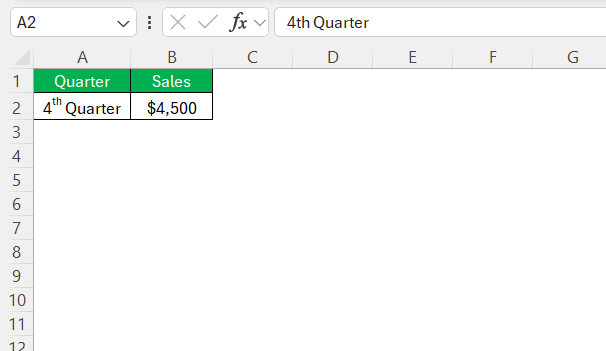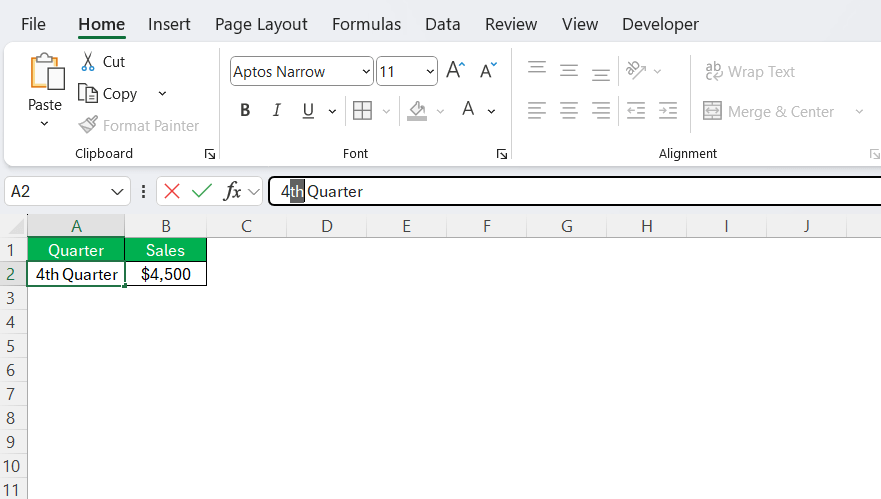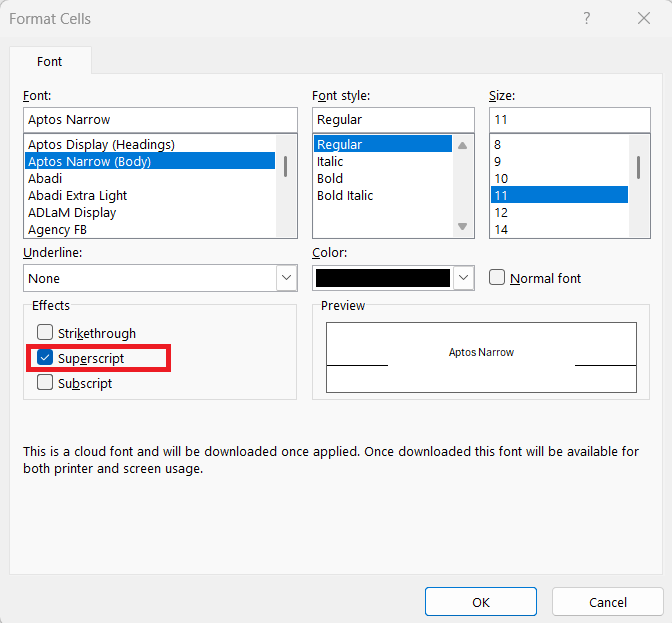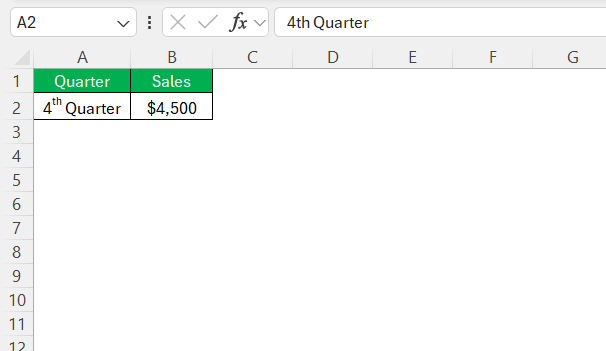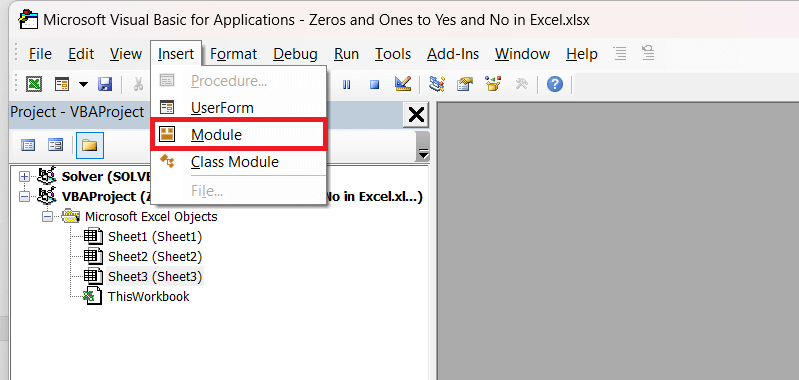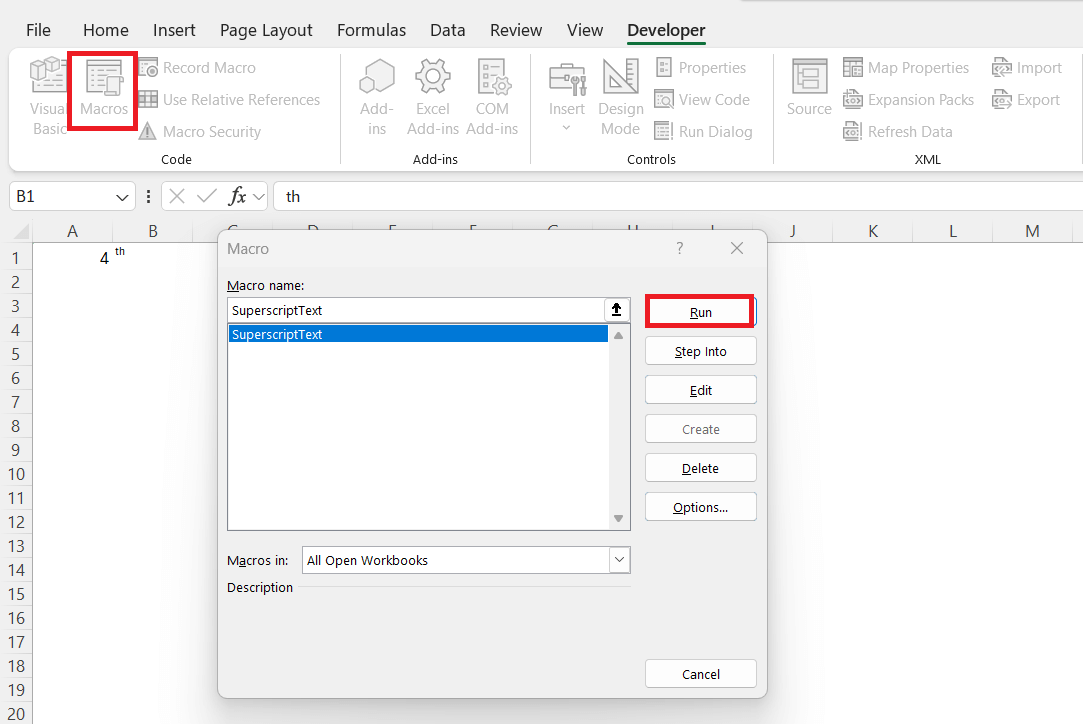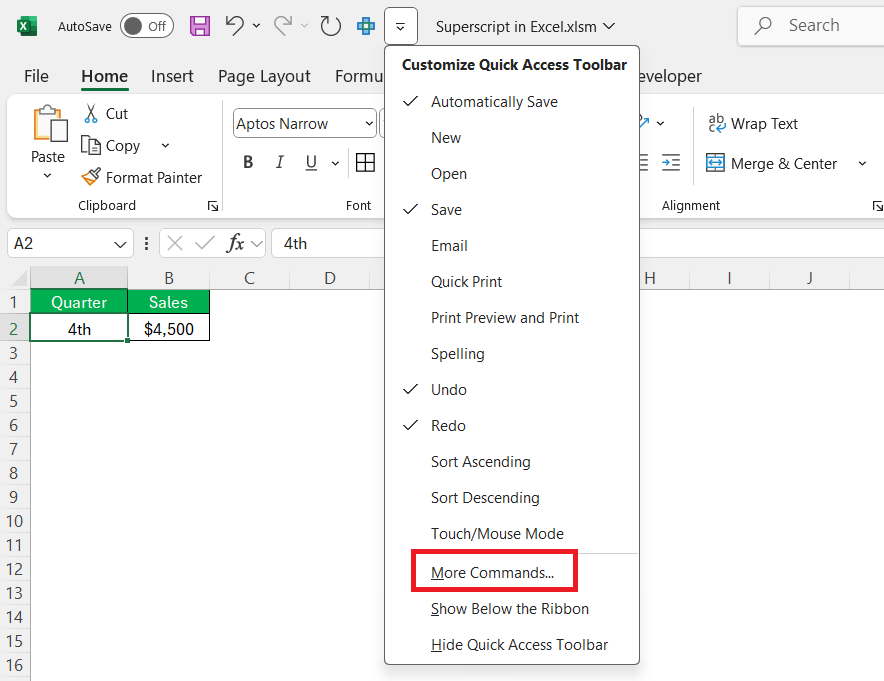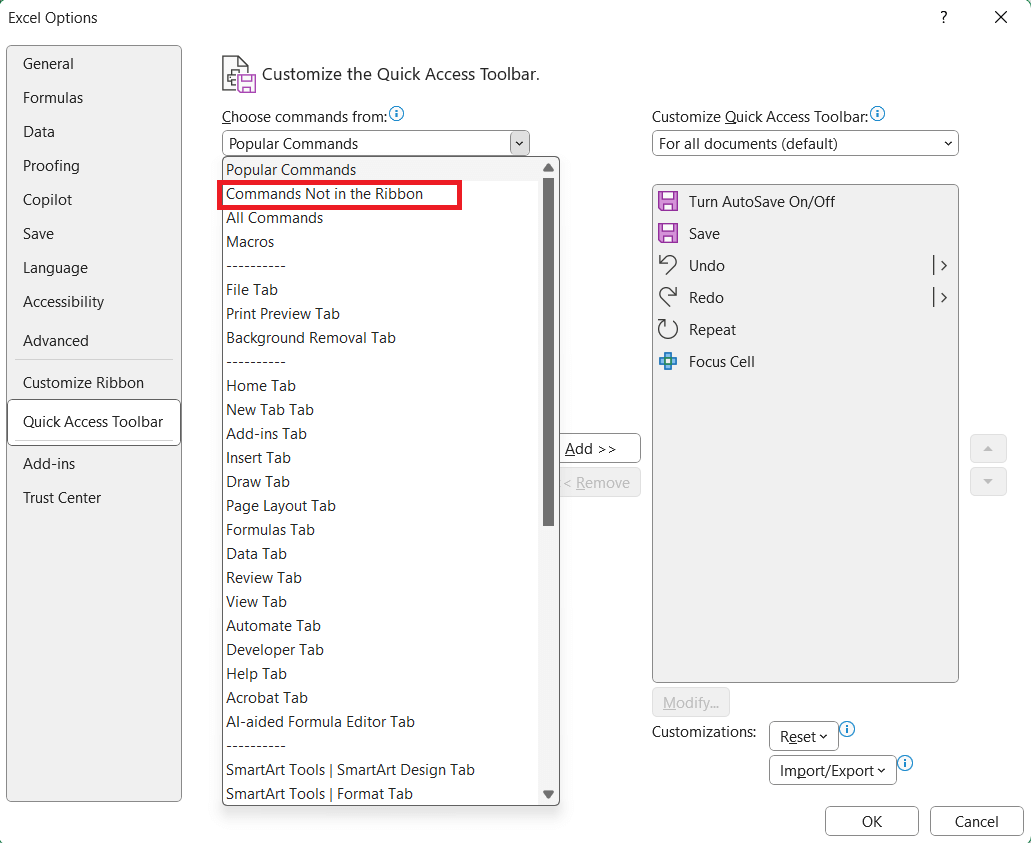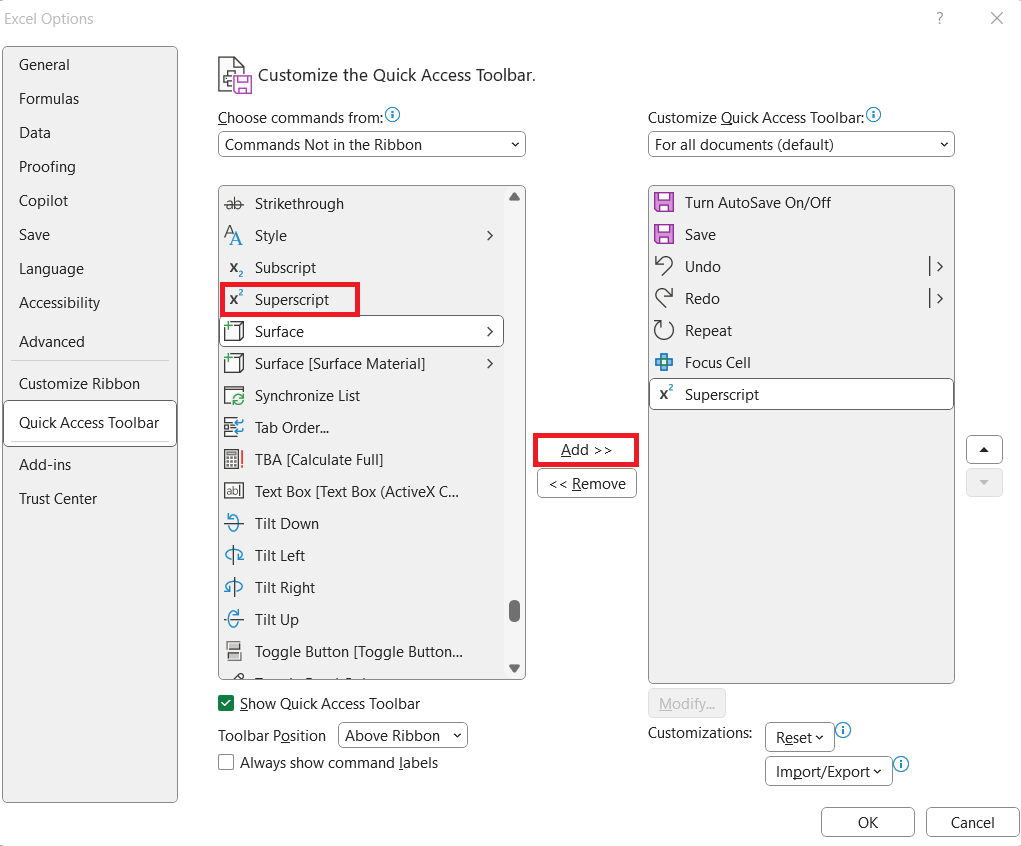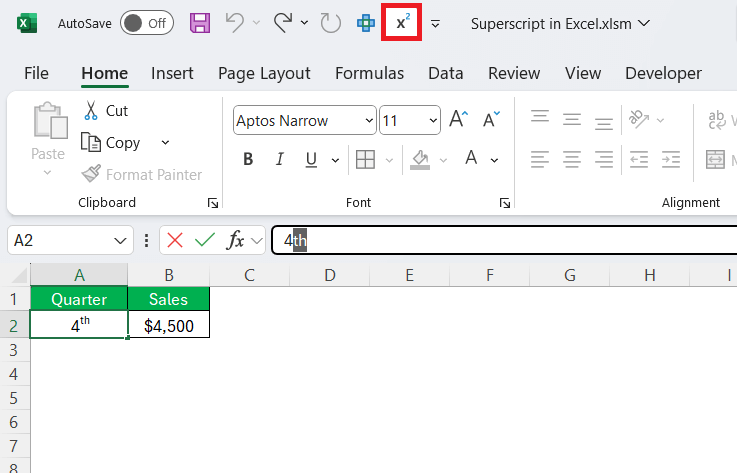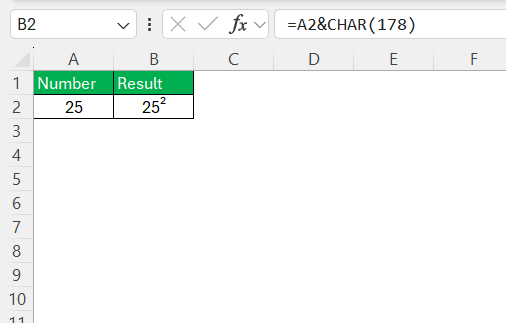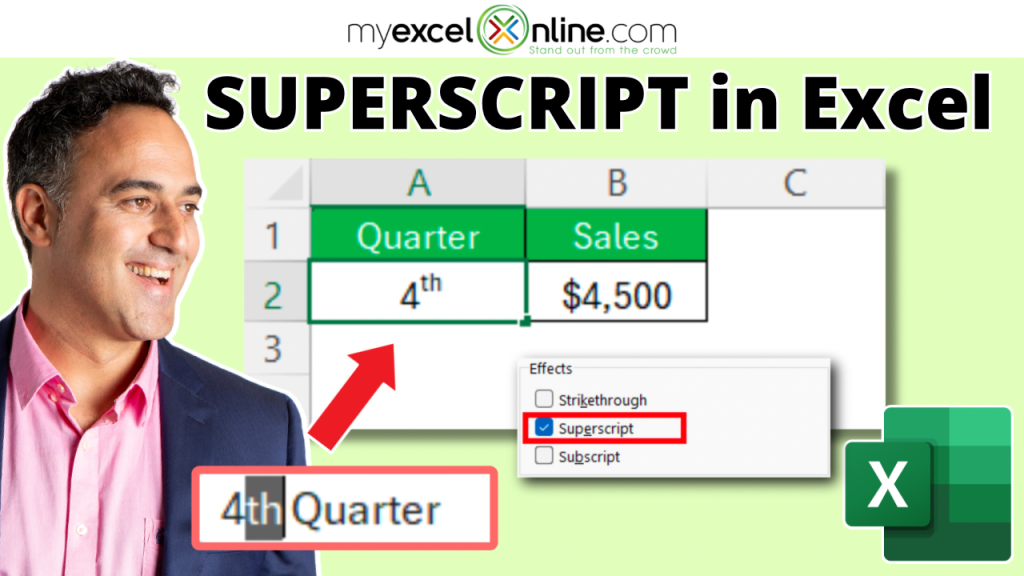
Key Takeaways:
- Superscripting in Excel enhances data presentation, particularly for mathematical and scientific expressions.
- While Excel lacks a built-in superscript function, methods like keyboard shortcuts, the Font dialog, and VBA can achieve this formatting.
- The Quick Access Toolbar can be customized to include a superscript button for faster access.
- Formulas using the CHAR function provide a workaround for superscripting numbers in Excel.
- Common superscript issues include grayed-out options, text alignment problems, and font compatibility, which can be resolved through proper formatting adjustments.
Table of Contents
Understanding Superscript in Excel
Definition and Uses
Superscript refers to the styling of text where certain numbers or letters are raised above the baseline level of the other text on a line. In Excel, this technique is particularly useful for situations that require mathematical notations, such as exponents, or when denoting footnotes within datasets.
Beyond purely academic or scientific purposes, superscripts can also enhance readability and clarity in business reports where special annotations or precise references are needed. While Excel doesn’t offer direct superscripting as a built-in function, understanding how to apply this formatting can significantly improve data presentation and make spreadsheets more professional and informative.
Common Applications in Spreadsheets
In spreadsheets, superscripts are commonly applied in various contexts, where precision and clarity are pivotal. One typical application is in financial reports, where currency or accounting standards may require specific symbols as superscripts, such as the ‘th’ in dates (e.g., 4th quarter).
Another common use is in scientific data sheets where chemical equations, physical constants, or mathematical expressions necessitate exponents. Superscripts also play a crucial role in academic settings, aiding in footnote referencing and creating structured academic papers. Each application underscores the importance of this formatting feature in delivering clear and accurate information through spreadsheets.
Methods to Superscript
Using Keyboard Shortcuts
Keyboard shortcuts provide an efficient method to apply superscript formatting in Excel without navigating through multiple menus. To superscript a character, select the text you wish to modify, then press Control, Shift, and the Plus sign (+) simultaneously.
This combination elevates the selected text slightly above the rest of the text line.
If your keyboard lacks a numeric keypad, activating the ‘num lock’ and using the standard keys may be necessary. Mastering these shortcuts can significantly streamline your workflow, especially when dealing with large datasets that require frequent formatting adjustments.
Superscripting with the Excel Ribbon
Superscripting through the Excel Ribbon involves several steps but provides a more visual method than keyboard shortcuts. Begin by selecting the text or numbers that require superscript formatting.
Next, navigate to the Home tab on the Ribbon and click on the small arrow in the Font section’s corner to open the Font dialog box.
In this dialog, check the Superscript option under the Effects section and then click OK.
This transforms your selected text into superscript, elevating it above the baseline.
Leveraging the Ribbon for superscript is especially beneficial for Excel users who prefer using mouse navigation over keyboard shortcuts.
Advanced Techniques
Superscript with VBA
Using VBA (Visual Basic for Applications) to implement superscript in Excel offers advanced automation and precision. For those comfortable with coding, a VBA macro can seamlessly apply superscript formatting across multiple cells. Here’s a straightforward macro to superscript selected text within a cell.
STEP 1: To utilize this macro, open the VBA editor by pressing Alt + F11.
STEP 2: Insert a new module by navigating to Insert > Module.
STEP 3: Then copy and paste the macro code.
Sub SuperscriptText() Dim Cell As Range Set Cell = ActiveCell With Cell.Characters(Start:=1, Length:=Len(Cell.Value)).Font .Superscript = True End With End Sub
Close the VBA editor and return to Excel. Select the desired cell and run the macro by pressing Alt + F8, selecting SuperscriptText, and clicking Run.
This macro intelligently applies superscripting to all selected cell contents, providing a consistent and automated approach to formatting. Automating superscript formatting through VBA is especially useful in large-scale projects where manual formatting would be tedious and error-prone.
Adding Superscript Buttons to the Quick Access Toolbar
Enhancing your workflow by adding superscript buttons to the Quick Access Toolbar in Excel is both practical and efficient. To customize your toolbar, start by clicking the drop-down arrow on the right side of the Quick Access Toolbar, usually found at the top left of the application. Choose More Commands from the list.
In the Excel Options dialog box, under the Choose commands from dropdown, select Commands Not in the Ribbon.
Locate and select the Superscript option, click the Add button, and then click OK to apply the changes.
This action will place a Superscript button directly on your toolbar, enabling quick access without navigating through menus.
If you frequently use superscript, this addition can save time, simplify repetitive tasks, and ensure accuracy across your spreadsheets by providing immediate access to this formatting feature.
Creating Superscripts Through Formulas
Creating superscripts through formulas in Excel leverages the CHAR function, which contains character codes for specific text formatting. Although not typically used for full-text superscripting, this method is effective for numerals. For instance, to display the number 25 with a superscript 2, you can use the formula =A2&CHAR(178), assuming ’25’ is in cell A2.
This formula concatenates the original number with the superscript character to represent 25².
For crafting a series of numbers with superscripts, this method offers a straightforward solution without altering the cell’s core numeral value. It is particularly useful when calculations involve powers, such as in physics or engineering datasets. However, this approach is limited to specific numeric superscripts with corresponding character codes, and it doesn’t alter the visual formatting for extensive text strings.
Practical Examples
Real-world Scenarios for Using Superscript
Superscripts find practical applications in numerous real-world scenarios within Excel, making data presentations more precise and professional. In scientific research, superscripts are indispensable for writing chemical formulas, such as H₂O or CO₂, where readability is crucial. Financial documents often use superscripts to denote percentage growth rates, footnotes, or legal disclosures, preserving the document’s layout while conveying essential information.
Academic projects benefit from superscripts to format citations and references, ensuring that detailed annotations do not disrupt the main content flow. In engineering and physics calculations, superscripting allows for clear representation of power notations, such as velocity squared (m/s²), crucial for accurate data analysis. Each of these applications demonstrates how mastering superscript formatting can enhance clarity and communication across various professional fields.
Troubleshooting Common Superscript Issues
While superscripting in Excel is generally straightforward, a few common issues might trip you up.
- Non-Editable Superscripts: If you’re trying to edit a cell and the superscript option is grayed out, ensure that you’re in the text edit mode by double-clicking the cell. This mode allows you to specifically select portions of text for formatting.
- Superscript and Text Alignment: Superscripting can sometimes disrupt text alignment, causing layout issues in your spreadsheet. To remedy this, adjust your column width or utilize the Wrap Text feature for a cleaner presentation.
- Font Changes: Some fonts do not support superscript characters, which can cause display problems. If your superscripts aren’t appearing correctly, try switching to a more widely used font like Arial or Times New Roman.
By addressing these common issues with these strategies, you can refine your use of superscripts in Excel to ensure your data remains both functional and visually appealing.
FAQs
How do you insert a superscript in Excel?
To insert a superscript in Excel, select the text you want to superscript, then navigate to the Home tab in the Ribbon. Click the small diagonal arrow in the Font group to open the Font dialog box. Check the Superscript option, and click OK to apply the formatting. Alternatively, use the keyboard shortcut Ctrl + Shift + + after selecting the desired text.
What is the shortcut for applying superscript in Excel?
The shortcut for applying superscript in Excel is to first highlight the text you want to modify, then press Ctrl + 1 to open the Format Cells dialog. Once open, use Alt + E to check the Superscript box, and press Enter to confirm the change. This method accelerates the application of superscript formatting.
How can I remove superscript formatting?
To remove superscript formatting in Excel, select the text with the superscript applied. Press Ctrl + 1 to open the Format Cells dialog box. In the Font tab, uncheck the Superscript option and click OK. This action will revert the text to its regular formatting without the elevated effect.
Is there a way to superscript numbers in Excel?
Yes, you can superscript numbers in Excel by using the Font dialog. Select the number you want to format, press Ctrl + 1 to open the Format Cells dialog, and check the Superscript box under the Font tab. Another method is using the CHAR function for numbers like 1, 2, and 3, which have special character codes (e.g., CHAR(178) for ²).
How do you superscript 2 in Excel?
To superscript the number 2 in Excel, select the cell or text containing the number, press Ctrl + 1 to open the Format Cells dialog box, check the Superscript option, and click OK. Alternatively, use the CHAR function in a formula, such as =A1&CHAR(178), to display a superscript 2 next to a value in cell A1.
John Michaloudis is a former accountant and finance analyst at General Electric, a Microsoft MVP since 2020, an Amazon #1 bestselling author of 4 Microsoft Excel books and teacher of Microsoft Excel & Office over at his flagship MyExcelOnline Academy Online Course.

